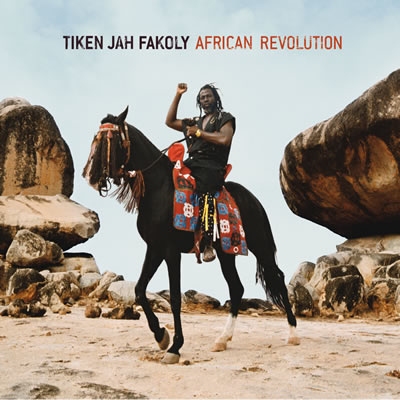African Revolution
Acailable from Sept 28th, pre-order available now!
A couple of measures will suffice to be persuaded: "African Revolution" is a radical turning point in Tiken Jah Fakoly's career, an album that will shake thirty years of the African reggae palm trees. Though is it still reggae?
Tiken Jah Fakoly has always taken risks. Since "Mangercratie," in 1996, he integrated the tongue of the Abidjan pavements, the root-est in all his merry arrogance that has ever caressed our eardrums. The most political as well: saying it as it is, the four truths to the face of the despots, destabilizing the official history Tiken challenged the disinformation standing out as the spokesman for millions of young African people. Without doubt, he joined the lineage of the Peter Tosh and the Bob Marley, the noblest branch in reggae: like them, he has become "the voice for those without voices."
After fifteen years of career, one Victoire de la Musique and several gold records, Tiken Jah Fakoly seemed to have nothing left to prove. His tenth album would have accommodated a good enough report... But as usual, Tiken took a risk. Unexpected, exciting, impeccably produced, "African Revolution" is exactly what he claims: African and revolutionary.
Before anything else he is revolutionary in his method of work. Tiken made his models on a motionless "riddim," Jamaican style, with a Thomas Naïm subtle guitar (known in particular for his work with Hindi Zahra). A trip to Tuff Gong, Bob Marley's studio in Kingston, was inevitable to place these three rhythmic sizes: Glen Browne (bass), Marc Dawson (drums) and Mickey Chung (guitar). Then there was Bamako. It is there, in his studio that Tiken concocted the music on the border of reggae and the "mandingue blues."
The magic tones of ngoni, kora, soukou (violin with one string) and balafon were familiar to us, but Tiken knew how to capture their soul. Five years of exile in Bamako enabled him to penetrate into the talented generation of the Griot sons, such as the player of ngoni Andra Kouyaté, who is growing very successful over there. These young wolves of the "new tradition" bring to Tiken’s music an unpublished lyrical bitterness ( Sinimory), and a subtle off centered shift in Jamaican rhythmic (Marley Foly).
The producers, Jonathan Quarmby and Kevin Bacon (who discovered Finley Quaye and produced his first album), knew how to transcend this meeting of alchemic arrangements and a magical mix, very remote from the usual Jamaican sound. The African instruments are glorified notes that vibrate feelings of several centenarians. Fewer feminine choirs, no more copper; it is Thomas Naïm's acoustic guitar that leads the game, impatient and roguish. The agreements grow rich, songs based on guitars / voice freed from the "tyranny" of the Jamaican one drop, the rhythmic diversity of the almost Caribbean balance to Vote for the elegance of the arpeggios Mandingoes.
Tiken wrote most of the songs, sometimes assisted by his old accomplice from Zebda, Magyd Cherfi (You have to get up, Africa waits). I do not want your power is Jeanne Cherhal's text and Let me express myself by Mr Toma, hope from the Parisian scene. I say no is a signed text and music by Féfé (Saïan Supa Crew).
A single featuring: that of Asa, on Political War, illuminated by natural grace and the candid perfection of the Nigerian singer.
African in the sound, the album is as well - natural - in the intention.
Meaning, it is to the entire black continent the singer addresses. "Go to school brothers intelligent revolution is African education" (African Revolution). It’s a call for the awareness of the African youth that runs through his songs: "Africa waits that his children wake up. But it sleeps, it sleeps, it does not move" (Africa waits) "nobody will come to change Africa our place, it is necessary to get up, rise, rise, to change all this." (We have to get up)...
But the way Tiken approaches the subject of Africa became more personal.
It is not the star that expresses himself, it is the man who doubts: "this is only a song, that will not change our lives" (I say no). It is the bitter man who sees his brothers being transformed into beggars: "I returned after 5 years of exile, from millions of young people without jobs, all with their hands stretched out" (Old father). It is an old man who turned his back on the mirage of the "silver mountains" and on the politics, he dedicates his stamps for schools and for fields: "I do not want your power, no need to have it, I do not want your glory, I want hope" (I do not want your power).
It is a more intimate, more sensitive Tiken that we discover.
African Revolution stands out as a ranging-milestone, not only for the artist, yet for all the reggae stages. A breath of fresh air, an example that will hand out the grain to grind an all-new generation …
But above all this album transcends the genres and projects a new sound, anchored in the tradition and modern determination, so that Africa will never cease to charm and amaze us.







